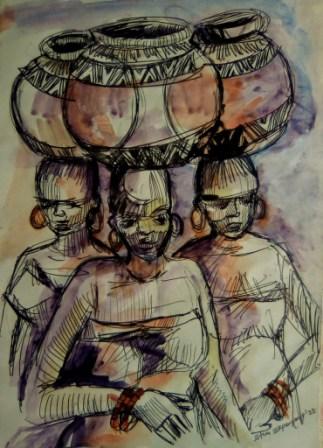Water, an Agent of Purification and Life Sustenance: The Relationships of Women with Water in the Southern Provinces of Nigeria

Published 2025-03-30
Keywords
- water rituals,
- traditional Nigerian societies,
- Osun Festival,
- Igbo people,
- roles of women
Copyright (c) 2025 Etim Ekpenyong Mfon (Author)

This work is licensed under a Creative Commons Attribution-NonCommercial-NoDerivatives 4.0 International License.
How to Cite
Abstract
In traditional Nigerian societies, women and girls predominantly bear the responsibility of fetching water, reflecting their nurturing roles within families and communities. Water is essential for domestic tasks like cooking, laundry, and child bathing, positioning women as the primary gatherers. Many Nigerian cultures link water with healing, purification, fertility, and life, often involving women in rituals that promote well-being and restore balance. This paper explores multi-ethnic Nigerian beliefs about women and water, with a special focus on the Igbo people. Over six months, interviews with women from various ages and social statuses provided diverse perspectives on these cultural practices. Key findings reveal the significant roles women play in festivals such as the Osun Festival in Osogbo, the Igue Festival in Benin City, and the Yemoja Festival in Ibadan, where rituals are centered around rivers and women are pivotal participants. Additionally, in many Nigerian cultures, it is frowned upon for men to perform domestic chores or fetch water, as these tasks are traditionally assigned to women. The study underscores the central role of women in water-related activities and rituals, emphasizing the need for policies that address the unique challenges women face in accessing water and sanitation.
References
- Adebayo, K. O. (2021). Local and Transnational Identity, Positionality and Knowledge Production: Reflections on Ethnographic Research in Africa and Asia" Retrieved March 12, 2025 from https://journals.sagepub.com/doi/.
- Adebayo, O. (2021). Yoruba African Women and Patriarchal Excesses in the Context of Globalization and Sustainable Development Goals. Asian Women, 37(3), 95–120. https://doi.org/10.14431/aw.2021.9.37.3.95
- Adeyinka, O. (2023). Arugbá : Unveiling The Profound Significance Of Òşun-Òşogbo Festival Retrieved: http://www.ancestrals.com.ng
- Agbaje, O. (2021). Water Symbolism in Yorùbá Folklore and Culture1. Retrieved March 10, 2025 from https:// www.researchgate.net/publication/357592748_Water_Symbolism_...
- Ahmed, S. (2021). "Water: Women and men have differential roles, rights and responsibilities." Retrieved August 11, 2023, from https://ideas4development.org/en/water.
- Akanni, A. & Uche C. (2014). Demographic dynamics and development in Nigeria. Vol. 27 No. 2 (2014): Supplement on Nigeria Population and Development Issues Retrieved: March 12, 2025 from https://aps.journals.ac.za/pub/article/view/471
- Akinjobin, A. I. (1980). The Yoruba and their neighbours, 1700-1890. Cambridge University Press.
- Akinwunmi, Rachael (2023). Interview with Researcher, Badagry, Lagos State.
- Akomolafe, C. (2023). Interview with Researcher, Lusada, Ogun State. 2:45 pm
- Arugba Osun Osogbo Festival (2023). Retrieved August 11, 2023 from: https://www.facebook.com/media/set/?set=a.
- Bayyinah, J. (2023). Osun, the Yoruba Deity. Retrieved September 11, 2023, from https://www.britannica.com/topic/Oshun
- Bradbury, Robert Elwyn. (1973). Benin studies. Oxford University Press.
- Bruce, A. (2014). The Sacred Journey. Retrieved June 14, 2023, from https://www.pbs.org/wgbh/sacredjourneys/content/osun-osogbo/
- Chukwu, A. (2018). Sacred waters: Spiritual significance and rituals in Igbo cosmology. Enugu: Igbo Studies Press.
- Chukwu, J. C. (2015). Role of Women in the Growth of the Traditional Igbo Economy. Journal of Culture, Society and Development, 10, 38-46. Retrieved March 12, 2025 from https://www.iiste.org/Journals/index.php/JCSD.
- Chuku, G. (2018). Igbo historiography: Part II. Retrieved March 12, 2025, from https://compass.onlinelibrary.wiley.com/doi/.
- CIA Worldbook. Nigeria Factsheet. Retrieved 5 March 2025, from https://www.cia.gov/the-world-factbook/countries/nigeria/factsheets/.
- Clara, Chief Mrs. Akomolafe (2023). Interview with Researcher, Ikorodu, Lagos State, 11:20 am.
- Concernusa. (2021). Why water is a women's issue. Retrieved August 30, 2023, from https://concernusa.org/news/water-is-a-womens-issue.
- Egharevba, A. (2025). Interview with researcher. Benin City, Edo State. 11:45 am
- Ekechi, F. K. (1971). Missionary enterprise and rivalry in Igboland, 1857–1914. London: Frank Cass and Company Ltd.
- Ekechi, F. K. (1972). Traditional Igbo rituals and their socio-cultural importance. Onitsha: Heritage Publishers.
- Eze, C. (2023). Oya, the Yoruba Rain Goddess. Retrieved September 11, 2023, from https://guardian.ng/life/oya-the-yoruba-rain-goddess
- Ezekiel, Amaka (2023). Interview with Researcher, Ojo, Lagos State. 2:45 pm
- Fela, K. (1975). Water No Get Enemy (Water Has No Enemy. Retrieved June 3, 2023, from https://genius.com/Fela-kuti-water-no-get-enemy-lyrics
- Femi, A. (2020). Dance, Water and Prayers: Celebrating The Goddess Yemoja. Retrieved July 16, 2023, from https://www.aljazeera.com/features/2020/12/6/dance-water-and-prayers-celebrating.
- Foreign Affairs Nigeria. (n.d.). Nigeria's culture. Retrieved December 26, 2024, from https://foreignaffairs.gov.ng/nigeria/nigeria-culture
- Idowu, Bankole (2023). The Arugba. Interview with Researcher, Yaba, Lagos state. 10 am
- Momodu, T (2024). Traditional festivals in Akoko-Edo: Celebrating womanhood during Uzoro festival. Retrieved: https://www.thehopenewspaper.com/traditional-festivals-in-akoko-edo-celebrating-womanhood-during-uzoro-festival/
- Nwa'Nsukka, A. (2022). Image of Ada igbo fetching water: Retrieved: https://commons.wikimedia.org/wiki/File:Ada_igbo_fetching_water.jpg
- Nwosu, A. (2019). Cultural Practices of the Igbo People. Heritage Books, pp. 67-89.
- Nwosu, I. (2019). Igbo culture and traditions: Understanding the customs of Nigeria's southeast. Heritage Publishers.
- Agbaje, O. (2021). Water Symbolism in Yorùbá Folklore and Culture1. Retrieved March 10, 2025 from https:// www.researchgate.net/publication/357592748_Water_Symbolism_...
- Onochie, U. (2024). Interview with Researcher, Asaba, Delta State. 11:30 am
- Onwuejeogwu, M. Angelu. (1981). An Igbo Civilization: Nri Kingdom & Hegemony. London: Ethnographica, pp. 45-78.
- Seligmann, L. & Estes, B. (2019). Innovations in Ethnographic Methods. Retrieved March 10, 2025 from: https://www.researchgate.net/publication/335718882_Innovations_in_Ethnographic_Methods
- Smith, J. (2020). Idemili: The river goddess and her role in Igbo mythology. Abuja: African Mythology Publications.
- Smith, J. (2020). The Demographics of Nigeria. New Press, pp. 215-230.
- Smith, T. A. (2020). Water and its impact on women in southeastern Nigeria: A comparative study. African Journal of Environmental Studies, 18(4), 120-135.
- Twinckl. (2023). Osun Festival. Retrieved July 3, 2023, from https://www.twinkl.com.ng/event/osun-festival-nigeria-2023
- Massimo, A. (2018). Ethnography and the digital fields of social media. Retrieved March 11, 2025, from https://www.researchgate.net/publication/324769808_Ethnography_and_the_digital.
- WHO. (2023). Women and girls bear brunt of water and sanitation crisis – new UNICEF-WHO report. Retrieved July 12, 2023, from: https://www.who.int/news/item/06-07-2023-women-and-girls-bear-brunt-of-water-and-sanitation-crisis---new-unicef-who-report
- World Atlas. (n.d.). Largest ethnic groups in Nigeria. Retrieved December 26, 2024, from https://www.worldatlas.com/articles/largest-ethnic-groups-in-nigeria.html
- Worldometer. (n.d.). Nigeria population. Retrieved December 26, 2024, from https://www.worldometers.info/world-population/nigeria-population

